Planning a motorcycle camping trip? What to take and how to take it.
And a few trip tips from our Gnarly Camping expert
The sun is shining (ok just try to imagine it...) and you have decided it is time to get away from it all and take that trusty motorcycle out for a nice camping trip in the Yorkshire Dales or the Mountains of Wales. Camping is the obvious choice for the freedom lover and as you are a motorcyclist you are probably a freedom lover too - eager for the open road and uncharted territory. Although a motorcycle can't be used as a room like a car can when you are camping, it gives you an unparallelled ability to get to places other vehicles can't reach and explore some of that undiscovered country just around the bend
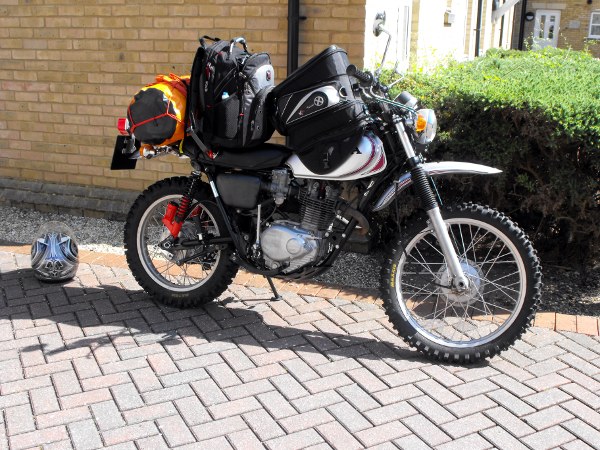
Off to pastures new
Although your carrying capacity is smaller on a motorcycle, with good planning and sensible packing, it can be a great discipline and travelling light has a lot to be said for it. Here are some practical tips about what essentials to take on your trip and how best to pack them...
Most importantly - don't overpack - everything needs to earn its right to ride with you by being extremely useful, nay essential! Think freedom and simplicity when you have got all your stuff for the trip together laid out on the floor and go back over it and take as many non-essential things away as you can.
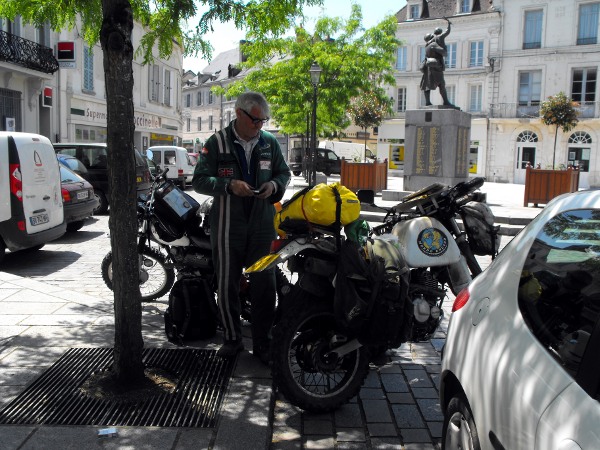
A shady rest
Before we go into the specific details of what you need to take remember one thing - simple common sense really - pack the heaviest things first down in the bottom of your panniers so that they won't make the centre of gravity of your bike too high up and make you unstable - a laden bike is usually fine as long as it is packed with the heaviest items as ballast towards the bottom. Having said this - try to pack the most useful things which you are going to need to access most, near the top.
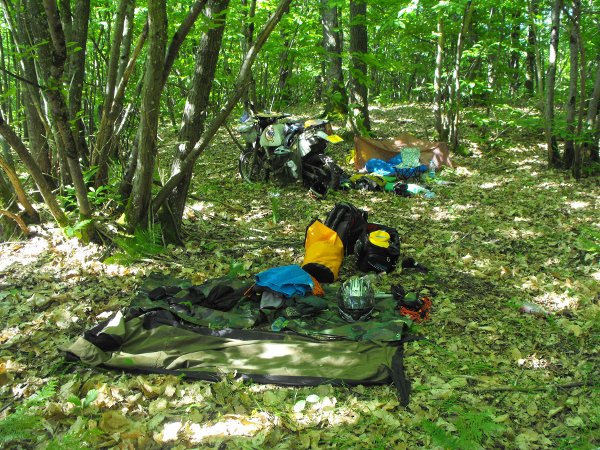
Wherever I lay my drysack, that's my home
Forward planning
If you have never been motorcycle camping before it is a really good idea to have a trial run before you set off into the wilderness for a month! Start by travelling light, with borrowed or improvised equipment. It is not a good idea to invest in lots of expensive state of the art stuff before you have established that motorcycle camping is for you or you might find that you are wasting your money. Equally it is sensible to start with just an overnight trip to somewhere at least a bit familiar to test the water. You can try cooking yourself a meal al fresco and brewing up so that you can see how much extra equipment that will entail as well - and test out just how comfy and warm that sleeping bag really is. Once you have got the motorcycle camping bug, then here are some suggestions about how to organise your trip.
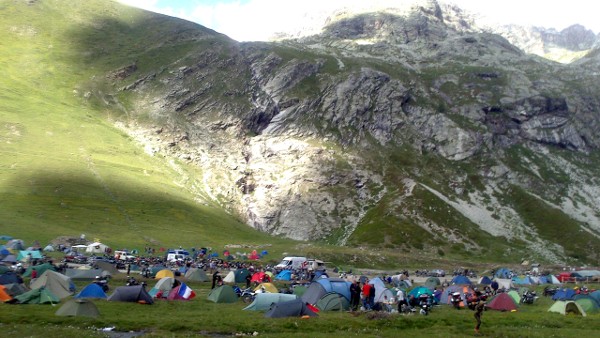
Hi de Hi
Firstly decide how much time you want to spend - a shortish trip for your first time is a good idea so that you can get used to it by degrees. Choose your destination and then have a look at the map to decide on where to stop along the way - campsites are good because they have facilities
like showers and toilets which make life easier
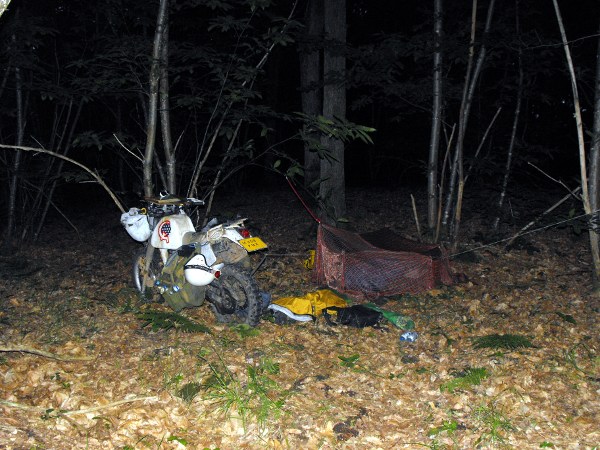
Gnarly man
Plot yourself a course along them and put in some rough camping nights if you want to in between two campsite stops. It is a good idea to check out that motorcycles are welcome at your chosen campsite and to book if it is a busy campsite or is in the middle of holiday season. Obviously you will need to make your route a loop so that you end up in your nice warm bed and hot shower. Make the time between campsites realistic so that you have time to pack up your kit properly and admire the scenery along the way.
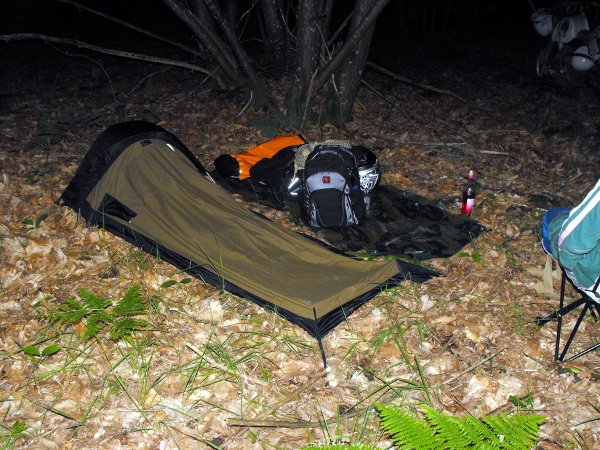
Woodland bivouac
Luggage
Tank bag
Get yourself a tank bag with a clear pocket on the top and put your route maps, driving licence, insurance details and any other documents you need in it where you can easily get them if you need them and see the map at a glance. A tank bag is a great piece of kit, they are usually pretty waterproof but for extra security put everything in a waterproof bag inside it. Tank bags can hold a large amount of stuff and are easily detachable if necessary. They are also good for weight distribution as they balance the weight centrally on the bike which makes it less tippy. They are a worthwhile investment as well as they are pretty hardy and you will be able to reuse one time and time again.
Our
gnarly camping expert says:
"Drysacks or army surplus ammo bags held on to your tank with magnets salvaged from an old hard disc drive and luggage straps!"
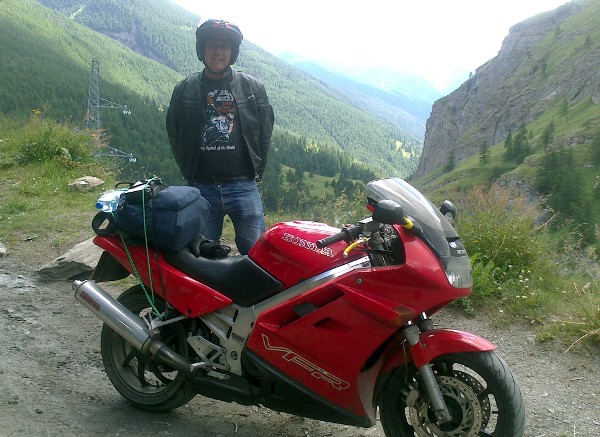
Excellent bungee work demonstrated
If you can afford a set of panniers they are also great, but if they don't fit your budget or your bike then army surplus stores have good tough bags you can use just fix them down with a set of
Lynx Hooks (great for attaching to each other to create a secure net around your bag) or bungees if you can't get Lynx hooks. When choosing your panniers try to get top opening ones as sometimes the side opening varitey can spill your luggage out onto the road whereas the top loading kind you can load with your stuff inside a soft bag which can just be pulled out when you stop for the night
and taken into your tent.
"Ex army rucksacks or ammo bags reinforced with estate agent signs"
Try to avoid securing luggage by strapping it down to another piece of luggage. This is not really secure, it is better to attach each thing to the frame or rack of the bike so that it is firmly anchored in its own right. A cargo net over everything is a good way to fix everything down. This also has the advantage that it is less likely to creep about and unbalance your motorcycle. Once you have fixed everything to your bike take it for a spin to see how it feels and make sure that everything is immoveable - you will have a much better trip that way!
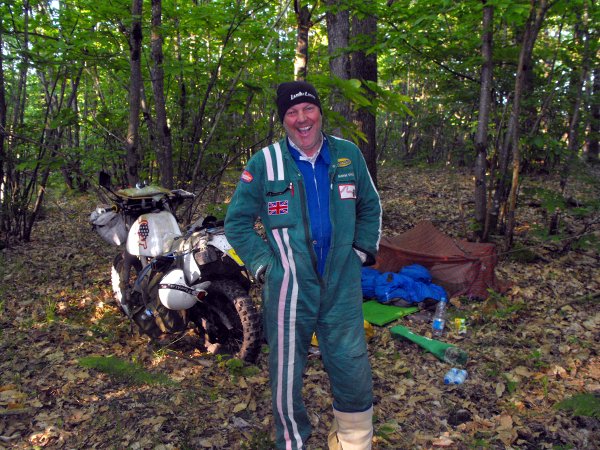
Austin Vince on the way to the Pyrenees - what a happy camper!
Either keep your documents on you at all times (it's best not to leave anything valuable on the bike if you can help it). If you do have to leave them then put them in different places, not all together for further security so if one lot does go missing then you will hopefully always have some (cash for example) somewhere else.
Clothes
It's common sense really but work out what the weather possibilities will be where you are going in advance. You can be pretty sure that at some point you will come across rain (especially if you are camping in the UK - what else would we talk about?) So plan what clothes and wet weathers you will need. There's nothing worse than getting cold or wet through because you don't have enough jumpers or waterproof gear, especially if you are camping.
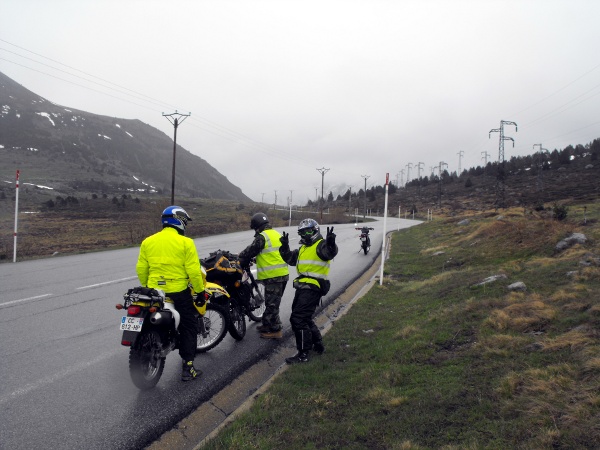
Into each life a little rain must fall
Also think about the terrain - if you are going to somewhere mountainous for example the weather can change fast and it can be cold at high altitudes so take enough layers to add. It is a good idea to work out what the maximum amount of clothing you will need each day is and what can double up so that you make sure that you don't overpack.
Generally synthetic materials are better as they dry quickly and pack better and can be easily layered if necessary.
Gnarly camping expert says:
"An ex army type poncho not only serves as an emergency waterproof but can also be used as a ground sheet, makeshift tent, bike cover or picnic blanket"

If you find you are missing your pets you can choose a natural alternative
If you are camping then drysacks are a really good idea as they will keep you clothes and sleeping bag (very important!) dry so that you can at least have a dry night. The more things you can keep separate in plastic bags the better, as it increases their chance of staying dry if they are double packed and even carrier bags from supermarkets are great for waterproofing (use good thick ones if you can they are tougher and more waterproof).

Don't worry 'bout the rain - pot of gold this way...
Get a light tent but it is a good idea to get one that is double the size you think you need - i.e a two man tent for one person allows you to stow all your luggage and kit inside the tent which will keep it dry and safe through the night. Make sure that it is a double skin and has a ground sheet (preferably a built in one) so that it is properly waterproof. Your sleeping bag should be small but warm. The key is small and portable - travel as light as you can so that your bike is not overloaded and you do not have endless piles of surplus stuff to get out and repack every time you stop.
Gnarly camping expert says - in a nutshell:
Bivi bag, bivi tent, poncho, sleeping bag & mozzie net is all you need!"
And don't forget ear plugs camspites can be rowdy, oh and a torch for night time wanders...
Breakfast of champions
Camping on a motorcycle (not literally – bit small and tippy) is a great cheap but adventurous holiday and you can tailor it into anything you want and your budget allows so give it a try, enjoy the ride and think how much you will enjoy this at the end!
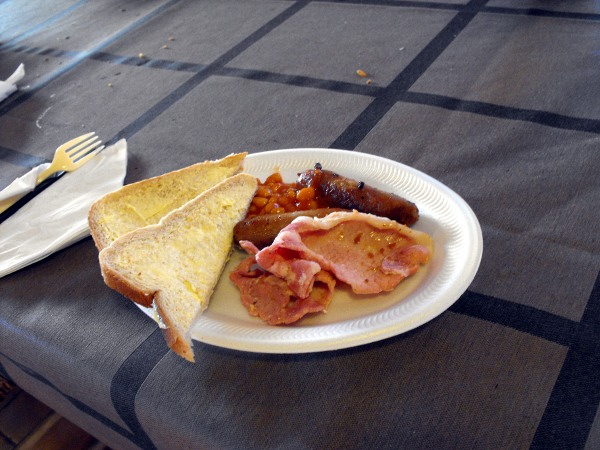
It was all worth it!











